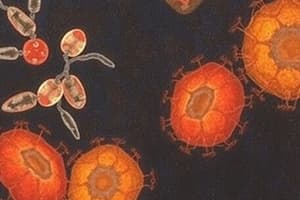Podcast
Questions and Answers
What is the purpose of PEGylation in immunogenicity?
What is the purpose of PEGylation in immunogenicity?
- To enhance the immunogenicity of a protein
- To shield the antigen from being recognized as immunogenic (correct)
- To reduce the effectiveness of monoclonal antibodies
- To increase the size of the protein
What is the main challenge in the pharmacokinetics of monoclonal antibodies?
What is the main challenge in the pharmacokinetics of monoclonal antibodies?
- Protein degradation
- Polyethylene glycol interference
- B cell fusion
- Passage in tissues (correct)
What type of monoclonal antibodies is no longer used for therapeutic purposes?
What type of monoclonal antibodies is no longer used for therapeutic purposes?
- Mouse monoclonal antibodies (correct)
- Polyclonal antibodies
- Human monoclonal antibodies
- Humanized monoclonal antibodies
What is the purpose of the hybridoma technique in monoclonal antibody production?
What is the purpose of the hybridoma technique in monoclonal antibody production?
What is the function of polyethylene glycol (PEG) in the hybridoma technique?
What is the function of polyethylene glycol (PEG) in the hybridoma technique?
What is the medium used to select correctly fused cells in the hybridoma technique?
What is the medium used to select correctly fused cells in the hybridoma technique?
Why do B cells die in the hybridoma technique?
Why do B cells die in the hybridoma technique?
What is the advantage of humanized or human monoclonal antibodies over mouse monoclonal antibodies?
What is the advantage of humanized or human monoclonal antibodies over mouse monoclonal antibodies?
Which type of monoclonal antibody has the lowest immunogenicity?
Which type of monoclonal antibody has the lowest immunogenicity?
What is the primary reason why murine monoclonal antibodies (-omab) were abandoned as drugs?
What is the primary reason why murine monoclonal antibodies (-omab) were abandoned as drugs?
What is the main difference between chimeric antibodies (-ximab) and humanized antibodies (-zumab)?
What is the main difference between chimeric antibodies (-ximab) and humanized antibodies (-zumab)?
What does the term "anti-drug antibodies" (ADAs) refer to?
What does the term "anti-drug antibodies" (ADAs) refer to?
Which of the following is NOT a characteristic of monoclonal antibodies?
Which of the following is NOT a characteristic of monoclonal antibodies?
How can therapeutic antibodies be used to treat autoimmune disorders?
How can therapeutic antibodies be used to treat autoimmune disorders?
What can occur if a patient develops antibodies against a medication?
What can occur if a patient develops antibodies against a medication?
Which factor is NOT mentioned as affecting the immunogenicity of protein drugs?
Which factor is NOT mentioned as affecting the immunogenicity of protein drugs?
Which situation could lead to antibody production that cross-reacts with endogenous proteins?
Which situation could lead to antibody production that cross-reacts with endogenous proteins?
Patients with what condition may be more prone to developing antibodies against self-antigens?
Patients with what condition may be more prone to developing antibodies against self-antigens?
The immunogenicity of a protein drug could potentially be lower when the drug is administered how?
The immunogenicity of a protein drug could potentially be lower when the drug is administered how?
What type of reaction could occur in a patient as a result of protein drug administration?
What type of reaction could occur in a patient as a result of protein drug administration?
Flashcards are hidden until you start studying
Study Notes
Immunogenicity and Modification of Therapeutic Antibodies
- PEGylation involves attaching polyethylene glycol (PEG) to proteins to shield them from immune recognition, reducing immunogenicity.
Pharmacokinetics of Monoclonal Antibodies (mAb)
- Monoclonal antibodies share pharmacokinetic properties with protein drugs, with the primary challenge being tissue penetration due to their size.
Production Techniques
- The hybridoma technique, developed in the 1970s, involves immunizing mice with target antigens to create mouse mAbs.
- B cells producing antibodies are fused with myeloma cells using PEG to allow continuous duplication.
- Selection of successfully fused cells occurs in HAT medium, where only hybrid cells survive due to their enzymatic capability.
Immunogenicity and Patient Response
- Administration of therapeutic antibodies can elicit the formation of anti-drug antibodies (ADAs), which may neutralize treatment efficacy.
- Immunogenicity is influenced by drug administration frequency; less frequent dosing may lead to lower antibody development.
- Potential adverse reactions include anaphylaxis and cross-reactivity, especially if the therapeutic protein resembles endogenous proteins.
Genetic Factors and Autoimmunity
- Patients with autoimmune conditions may have heightened susceptibility to developing antibodies against self-antigens due to impaired immune regulation.
Types of Monoclonal Antibodies
- Mouse monoclonal antibodies (suffix -omab) are highly immunogenic and largely replaced in therapeutic use.
- Chimeric antibodies (suffix -ximab) have a human constant region but retain 33% murine variable regions, reducing but not eliminating immunogenicity.
- Humanized antibodies (suffix -zumab) contain only 5-10% murine sequences, resulting in significantly lower immunogenicity.
- Fully human antibodies (suffix -umab) have minimal or no murine content, offering the lowest immunogenic profiles.
Conclusion on Antibody Immunogenicity
- Regardless of the type, all therapeutic monoclonal antibodies can induce ADA responses to varying extents, impacting clinical effectiveness.
Studying That Suits You
Use AI to generate personalized quizzes and flashcards to suit your learning preferences.




